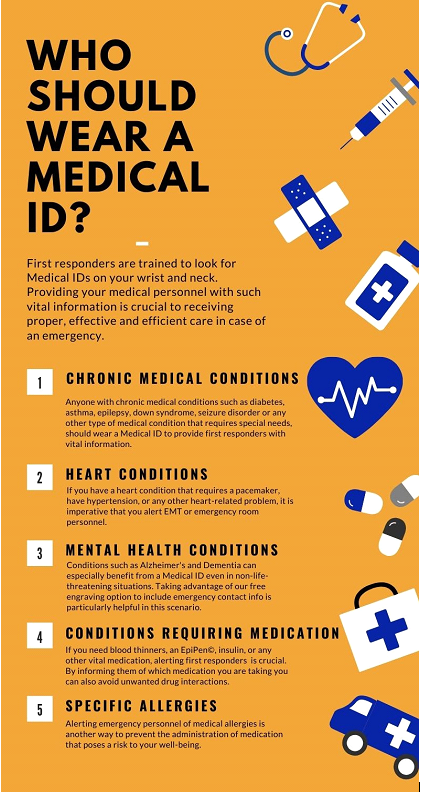Who should wear a medical ID?
Anyone with chronic medical conditions, mental health conditions, specific allergies or in need of specific medications such as blood thinners or an EpiPen should be equipped with a Medical ID at all times. This covers a wide range of medical conditions that includes but is not limited to the following list. These are the most common medical conditions that can be aided by a medical ID:

- ADD/ADHD
- Allergies (Drug, Food, Insect)
- Alzheimer's/ Memory Impairment
- Anemia
- Asthma
- Autism
- Blood Disorders
- Blood Thinners
- Breathing Disorders
- Cancer
- Cardiac Problems
- Cerebral Palsy
- Congestive Heart Failure
- Cystic Fibrosis
- Dementia
- Dialysis Patient
- Diabetes
- Epilepsy/Seizure Disorders
- Emphysema
- Gastric Bypass
- Graves Disease
- Hearing Impairment
- Heart Conditions
- Hemophilia
- Hypertension
- Kidney Failure
- Kidney Transplant
- Lymphedema
- Mental Health Disorders
- Multiple Sclerosis
- On Multiple Medications
- Organ Donor
- Parkinson's Disease
- Pulmonary Conditions
- Peanut Allergy
- Rare Medical Conditions
- Special Needs
- Stroke
- Tourette Syndrome
- Vision Impairment
- Von Willebrand's
Wearing a food allergy bracelet, asthma medical alert, diabetes medical alert, autism medical alert, or epilepsy medical alert can make a big difference should you find yourself in a life-threatening situation.
Chronic medical conditions can be difficult or slow to detect in case of an emergency and wearing a medical ID helps first responders and medical personnel by providing the information they need to administer effective and efficient care. It also provides you with peace of mind and reassurance that you have provided all vital information in order to avoid misdiagnosis and receiving treatments that are a risk to your medical condition.
The vast majority of first responders are trained to look for Medical IDs on your wrist and neck, according to a survey by American Medical-ID. Therefore, it is important for you Medical ID to be easily noticeable by medical personnel. Wearing a medical ID that is too flashy or looks like regular jewelry can easily be overlooked and fails to alert medical staff of any information that make a difference in case of an emergency.